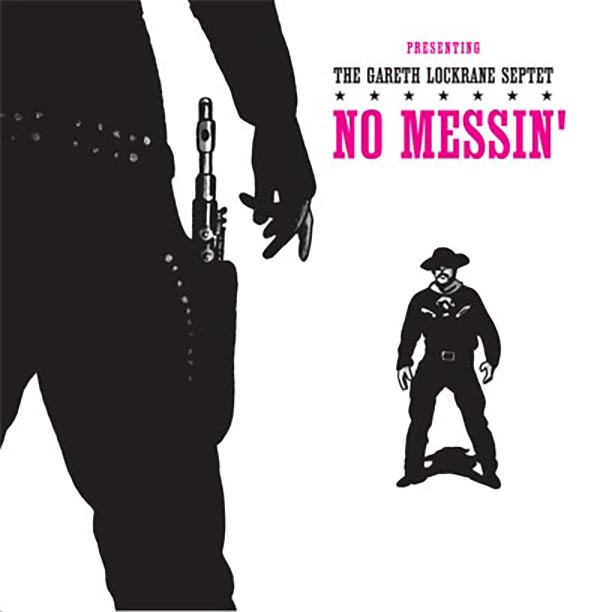
by Ian Mann
January 12, 2010
/ ALBUM
Full of enterprising compositions and arrangements with some great playing from all concerned
Gareth Lockrane is arguably the UK’s leading jazz flautist. Born in 1976 he took up the instrument at the age of ten inspired by the likes of Frank Wess, Roland Kirk, Joe Farrell, Hubert Laws and other names to be found in his father’s record collection. He progressed through NYJO with whom he still retains close links as a writer and arranger and also studied in England under Stan Sulzmann and Eddie Parker and in New York with Joe Lovano and others.
Whilst Lockrane was still at music college in 1997 his band The Jazz System featuring pianist Tom Cawley, saxophonist Osian Roberts and drummer Matt Fishwick acquired a considerable reputation on the international festival circuit. All four are now respected professionals and Lockrane has played with a whole host of other illustrious names in the intervening years.
In 2002 he formed the band Grooveyard fronted by himself and saxophonist Alex Garnett and driven by the Hammond organ of firstly Pete Whittaker and currently Ross Stanley. The group have released two albums “Put The Cat Out” (2003) and “Roots” with a third release imminent. Gareth was kind enough to send me a copy of the first Grooveyard album along with this latest release and I hope to take a look at that another time.
Most of Grooveyard’s output consists of Lockrane’s original compositions and he is the sole writer of the material played by this excellent septet. Lockrane says of “No Messin’”-“I grew up listening to all the great /composer arrangers in jazz; Gil Evans, Herbie Hancock, Bill Holman, Kenny Wheeler, Jimmy Heath, Thad Jones and many others. I always wanted to try my hand at a record that walked a tightrope between the blowing and the horn writing and this is it!” He sees the album as a tribute to the names in his roll call of heroes and listening to the music there is no doubt that he has fully succeeded in his objectives.
“No Messin’” is full of enterprising compositions and arrangements and there are some memorable solos from Lockrane (flute, alto & bass flutes) and horn players Robbie Robson (trumpet), Trevor Mires (trombone and euphonium) and Steve Kaldestad (tenor sax). The rhythm section of Robin Aspland (piano) and the “Two Matts”, Miles (bass) and Home (drums) swings prodigiously throughout. It’s amazing just what a “big” sound the seven man line up is able to achieve and they groove relentlessly. “No Messin’” is an unpretentious, swinging album with some great playing from all concerned. Perhaps it’s no co-incidence that Lockrane also runs an eighteen piece big band that incorporates some of these players.
The opener simply entitled “Dennis Irwin” packs a considerable punch. Whether it’s a dedication to the late, great American bassist or to the former Manchester United, Leeds, Oldham and Ireland full back I wouldn’t like to say. With it’s rhythmic clout and take no prisoners attitude the music could apply equally to either. Aspland, Miles and Home underpin inventive solos from Kaldestad, Robson and Lockrane himself. The horn arrangements are consistently interesting with Lockrane’s flute and Mires’ trombone providing colouration and counterpoint to the soloists.
“Plan B” is more laid back with some fine ensemble playing, an exquisite, lyrical solo from Robson and a spell in the limelight for the excellent Aspland, surely one of Britain’s most underrated pianists.
The fast shuffle of “No Messin’” itself is a springboard for the lithe tenor of Canadian saxophonist Kaldestad with Aspland once again demonstrating his considerable abilities. Lockrane himself then cuts loose on flute showing why is rated one of the best exponents of the instrument in the country.
“Surf’s Up” is a brief but enjoyable excursion into funk territory led off by Lockrane’s flute and featuring pithy solos from the “low end” by trombonist Mires and bassist Miles.
At eight and a half minutes plus “We’ll Never Meet Again” is the most ambitious piece of writing on the album. Lockrane’s alto flute combines sumptuously with Kaldestad’s tenor and Aspland’s piano in the early stages. Robson’s velvety flugel and Aspland’s limpid piano then take over before Lockrane returns, again delicately underscored by the other horns. Kaldestad then solos in tender fashion, followed briefly by Robson with Lockrane then returning for the third and final time. It’s all very lovely and proves that the group can be subtle as well as punchy.
“Minor Move” is an easy going swinger with something of a “TV theme” feel to it. Lockrane dominates early on before Kaldestad, Mires and Lockrane take off with a series of engaging solos propelled by springy bass and crisp, metronomic drums.
The septet adopt a gentle Latin groove for “Cancion Sin Llamar” or “The Bossa With No Name”. Lockrane is heard on breathy bass flute with other solos coming from trombonist Mires,pianist Aspland and finally the impressive young trumpeter Robson.
“Dark Swinger” is an appropriately flag waving finale with the two Matts swinging like crazy and urging exuberant solos from Aspland, Lockrane and the versatile Robson. The pace drops briefly as bassist Matt Miles takes a solo but a bustling coda takes things storming out.
“No Messing” is a hugely enjoyable album with some great playing all round. In a well judged programme Lockrane’s writing and arranging is consistently interesting with some fine ensemble passages for the four horns He strikes just the right balance between discipline and freedom, subtlety and exuberance and there are several memorable solos from the leader plus Kaldestad, Robson and Aspland.
In other words Lockrane has fully achieved his objectives and this album stands as a worthy tribute to his heroes as well as a fine record in it’s own right. There’s nothing new here but the quality of the tunes and the performances should hold considerable appeal for listeners right across the jazz spectrum.
blog comments powered by Disqus